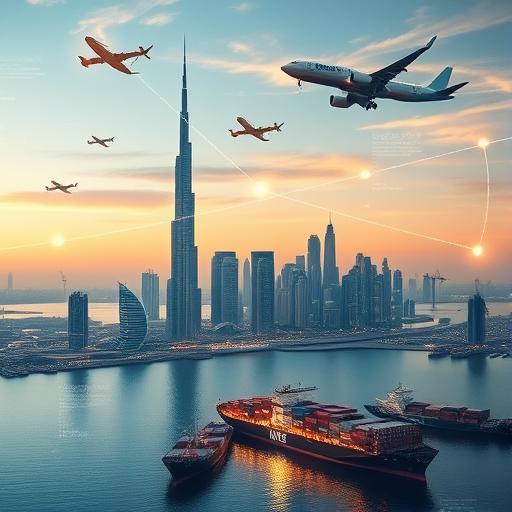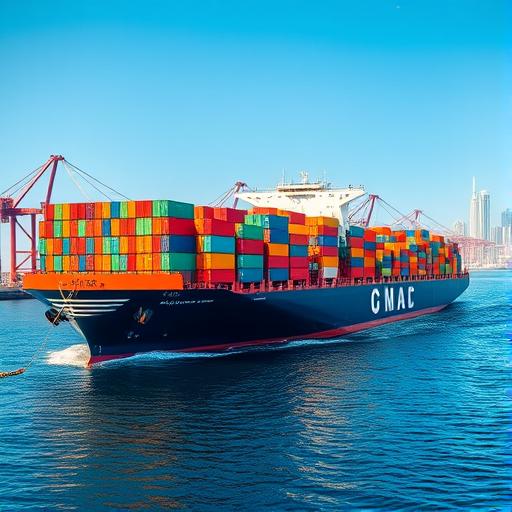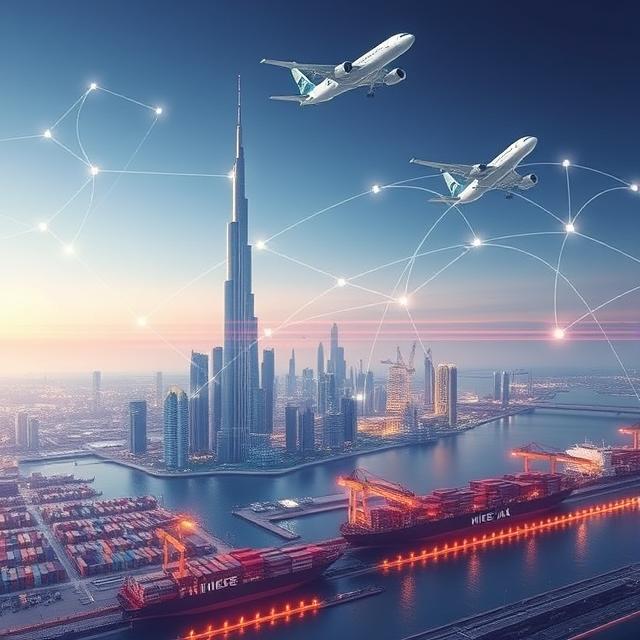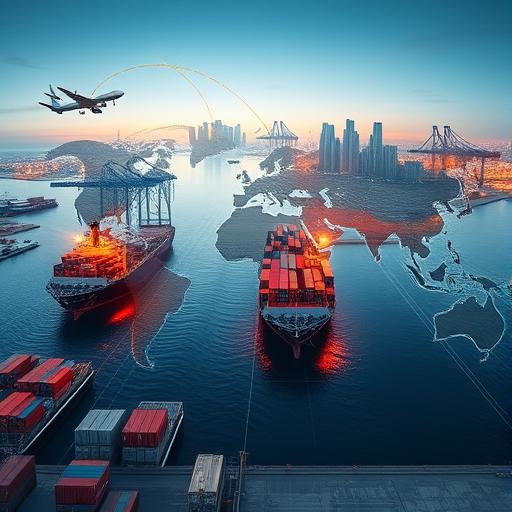Table of Contents
Introduction – Dubai’s Maritime Legacy and the Future of Global Shipping
Dubai’s rise as a global trade hub is inseparable from the story of sea freight.
Strategically located between Asia, Europe, and Africa, the city serves as a vital bridge for international trade. In 2025, sea freight from Dubai continues to power global logistics, enabling the seamless movement of goods from the UAE to major destinations such as the UK, USA, India, and Africa.
The Port of Jebel Ali, one of the world’s largest and most advanced ports, remains the cornerstone of this ecosystem—offering unmatched connectivity, infrastructure, and speed for international cargo.
Understanding Sea Freight from Dubai – The Backbone of Global Trade
Sea freight, or ocean freight, is the method of transporting goods across the world’s oceans using container vessels. It’s ideal for bulk shipments, heavy cargo, and international logistics that prioritize cost-efficiency over speed.
Dubai’s sea freight network connects with every major global port through weekly services. Whether exporting consumer goods to Europe or importing raw materials from Asia, sea freight ensures scalability, reliability, and value for money.

Types of Sea Freight
- FCL (Full Container Load): Exclusive use of a container, ideal for large shipments.
- LCL (Less than Container Load): Shared container space, cost-effective for smaller volumes.
- Reefer Containers: Temperature-controlled units for perishables.
- Open-Top & Flat-Rack Containers: Used for machinery, vehicles, or oversized cargo.
Major Sea Freight Routes from Dubai in 2025
Dubai’s trade corridors span every continent, with some routes seeing record traffic in 2025:
- Dubai → United Kingdom (Felixstowe, Southampton): Automotive parts, textiles, and electronics dominate.
- Dubai → USA (New York, Houston): High-value consumer goods, machinery, and chemicals.
- Dubai → Africa (Ghana, Nigeria, Kenya): Vehicles, construction materials, and food products.
- Dubai → India (Mumbai, Chennai): Raw materials, petroleum derivatives, and electronics.
With its central position and advanced port logistics, Dubai cuts average transit times by nearly 20% compared to other Middle Eastern trade hubs.
Container Types & Common Cargo
Choosing the right container is critical for efficient shipping and cost control:
| Container Type | Ideal For |
|---|---|
| 20ft Standard | General cargo, small shipments |
| 40ft Standard | High-volume consumer goods |
| Reefer | Food, medicine, perishables |
| Flat Rack | Heavy machinery, vehicles |
| Open Top | Industrial materials |
Dubai exports everything from electronics and furniture to automobiles and petrochemical products, making it a top global re-export hub.
Sea Freight Costs from Dubai – What Affects Pricing?
The cost of sea freight from Dubai depends on multiple dynamic factors:
- Distance & Destination: Longer routes like Dubai–USA are naturally costlier than regional ones (Dubai–India).
- Container Type & Volume: FCL is more expensive but secure; LCL saves cost for smaller loads.
- Port Charges: Handling, terminal, and storage fees vary by port.
- Seasonal Demand: Peak seasons (Oct–Dec) may see a 10–15% rate hike.
- Fuel & Surcharges: Bunker fuel prices directly influence global shipping costs.
On average, a 20ft container from Dubai to the UK can cost between USD 1,200–1,800, while shipments to India may be USD 400–600 depending on cargo type.
The Sea Freight Process – Step-by-Step from Dubai
1. Booking & Documentation
Every shipment begins with accurate paperwork: commercial invoice, packing list, bill of lading, and certificate of origin.
2. Cargo Packing & Pickup
Goods are packed according to international standards to ensure safety during long transit.
3. Customs Clearance & Port Handling
Dubai Customs uses smart clearance systems, ensuring most exports clear within hours.
4. Loading & Ocean Transit
Containers are loaded onto vessels at Jebel Ali, Mina Rashid, or Hamriyah Port. Transit tracking is available through digital freight platforms.
5. Destination Delivery
Upon arrival, cargo is cleared at the destination port and delivered to the consignee through inland logistics.

Advantages of Sea Freight from Dubai
- Cost-Effective for Bulk Shipments: Sea freight is often 70–80% cheaper than air freight.
- Massive Capacity: Ideal for industries like construction, automotive, and retail.
- Eco-Friendly: Lower carbon footprint compared to other modes.
- Global Reach: Access to 150+ countries through Jebel Ali’s trade routes.
- Reliability: Predictable schedules and standardized procedures ensure consistency.
Challenges and Their Solutions
While sea freight remains efficient, it’s not without challenges:
- Port Congestion: Managed through smart scheduling and flexible route selection.
- Customs Delays: Can be avoided through pre-clearance and compliance checks.
- Cargo Damage Risks: Minimized with proper packaging and insurance coverage.
- Fluctuating Freight Rates: Partnering with established logistics providers helps secure stable contracts.
Smart Ports and the Future of Sea Freight (2025–2030)
Dubai’s maritime future lies in digitalization and automation.
Smart container tracking, blockchain documentation, and AI-powered logistics are revolutionizing sea freight operations.
The Dubai Maritime Vision 2030 focuses on sustainability, innovation, and paperless trade—making Dubai a role model for global port efficiency.
By 2030, AI-powered scheduling and autonomous vessels are projected to reduce shipping delays by up to 30%, ensuring faster and greener trade routes.

Choosing a Reliable Sea Freight Partner in Dubai
When selecting a logistics partner, prioritize:
- Global Network: Ability to manage both export and import routes.
- Transparent Pricing: Clear breakdown of charges and surcharges.
- Customs Expertise: Smooth clearance process in Dubai and destination ports.
- Tracking Systems: Real-time shipment visibility.
- Industry Experience: A proven track record across various cargo types.

For international collaborations and reliable sea freight management, global businesses often collaborate with trusted Dubai-based logistics firms
Conclusion – Navigating the Global Economy through Dubai’s Ports
In 2025, sea freight from Dubai continues to define how the world trades.
With its strategic location, advanced infrastructure, and commitment to innovation, Dubai remains the maritime capital of the Middle East.
From FCL containers bound for London to reefer shipments headed to Africa, the city’s ports are gateways to prosperity and global growth.
Choosing the right freight forwarder ensures your cargo sails smoothly across oceans — connecting Dubai’s excellence with the world’s demand.






Leave a Comment